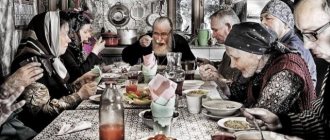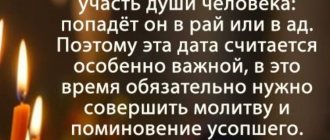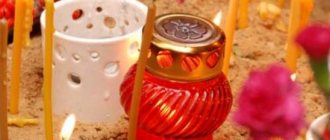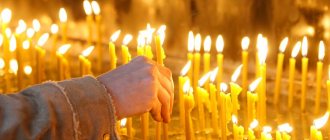The loss of a relative or loved one is an unthinkable tragedy that provokes deep apathy towards life, emotional and even physical stupor. Nevertheless, mourners continue to live in society, and therefore are obliged to observe traditions, church canons, as well as generally accepted rules of behavior after seeing off the deceased on his last journey.
A clear understanding of what can and cannot be done after the funeral will allow you to demonstrate sincere respect for the deceased, as well as avoid all kinds of gossip, gossip and gossip.
Basic rules for organizing and conducting funerals
Orthodox Christians treat the order of burial of the deceased and his memory responsibly and with respect. One of the manifestations of respect is the prayers of loved ones for the soul of the deceased, holding wakes and memorial services. What is worn to the cemetery about beliefs in Christianity, the soul of the deceased remains for 40 days in the house, next to the family. During this period several rules are observed.
- Before burial, the body of the deceased is washed so that he can appear clean before God.
- After washing, the body of the deceased is dressed in clean clothes.
- Candles should burn near the coffin, and relatives should read prayers.
- All mirrors in the house should be covered for 40 days.
During a funeral, it is common for relatives to cry and grieve for their departed loved one. Prayer and faith that the soul will find protection and mercy from God can soothe grief. It is not recommended for children to go to the cemetery or stand near the grave; pregnant women do not go. After the cemetery, you must wash your hands before sitting down to mourn. The funeral is held not in the cemetery, but in the house or in a place specially designated for this purpose.
After his death, the family of the deceased is often helped with the funeral by neighbors, relatives, and colleagues; they go to funeral services. They share the pain of loss and provide an opportunity to spend the last hours near the deceased without fuss. When people bury their loved ones, it is difficult for them to think about everyday issues, prepare a funeral table or order a hearse. But the very next day, family members need to get together to properly carry out all the rituals and pray. How to behave correctly on the first day after the funeral, what services are ordered, do you need to go or go to the grave?
Devyatiny - the ninth day after death
On the ninth day, the soul of the deceased leaves the heavenly palaces and descends to Hell in order to overcome all the ordeals that have befallen it. Each of them is intended for those who lived an unrighteous life - they lied, fell into despondency, and committed other sins. And the more often the sins were committed, the stronger the mental anguish. Only through the prayers of relatives and friends can one soften the prepared fate and help overcome trials. On this day, the relatives of the deceased also gather at the funeral table, pray together for the deceased, and talk about the deceased in a positive way.
Visiting the grave after the funeral
The day after the funeral, the relatives are also in grief, missing the deceased. And their desire to quickly go to the cemetery and visit the grave is understandable; sometimes relatives travel and visit it from afar. According to Christian beliefs, the soul is still attached to the burial place, and therefore the family is also drawn there. Traditionally, relatives bring breakfast to the cemetery the day after the funeral. Not everyone knows why they need to come with breakfast. Those who come to them want to awaken a loved one and reconcile the soul of the deceased with the fact that it will already be in the afterlife.
What to do during visiting hours near the burial site? You can tidy up a little near the grave, straighten the wreaths, and light a candle. Food is laid out, usually those that are left over from the funeral dinner after the funeral are carried. But you must bring food and dishes that comply with Orthodox rules and adhere to customs. Traditionally they bring:
What not to do at a relative’s funeral: signs
Indeed, many people associate funerals with something magical, the other world. Perhaps this is true, but no one can verify. If the ritual is performed incorrectly, the soul of the deceased will not find peace and will annoy the living. Some manipulations carried out at a funeral can cause bad luck for relatives, as well as those invited to the procession.
It is worth noting that funerals are indeed associated with powerful energy, which can cause various diseases, as well as damage. This is an excellent place for sorcerers and magicians who seek to draw their energy and communicate with the other world. That is why it is often possible to suffer damage, the evil eye, or some health problems at a funeral.
At a relative's funeral
What not to do at the funeral of a relative, signs :
- Come to the cemetery during the funeral with your child. The fact is that babies and children have rather weak energy, so it’s easy to infiltrate it and cause harm. Very often, after a funeral, children feel ill, with nausea, vomiting and general malaise. Therefore, refrain from attending funerals with children.
- Signs at the funeral of a relative concern not only children, but also pregnant women. It is not recommended for women who are expecting a child to attend the funeral. This is due to the fact that the soul of the deceased can harm an unborn child. It is noted that pregnant women who have attended funerals very often give birth to stillborn children.
- You should not cross the road along which the funeral procession and the crowd are walking along with the coffin. By this act you can bring trouble upon yourself, or earn some kind of illness.
- Try not to step on flowers dropped by people invited to the cemetery; it is best to avoid them.
- You cannot stand on the very edge of the grave during the funeral of a family member. If a person falls there, it promises his death in the near future. Accordingly, it is necessary to move away from the grave.
- Don't pick up anything from the grave. That is why it is necessary not to wear jewelry to a funeral, and not to take valuables with you. Even if a very valuable thing, a piece of jewelry, falls into the grave, you should not go down and pick it up. It is necessary to leave this product inside the grave. Whoever descends into the grave will soon die too.
Funeral ceremony
What to do with food from funerals and wakes
A funeral dinner, breakfast after the funeral at the grave - these are expressions of respect for the deceased, remembrance of him. You should collect the necessary products at home in the morning, take candles, bring flowers, and go to the cemetery. At the end of the ritual breakfast, food remains near the grave; beggars who walk nearby can pick it up. Baked goods are carried to church and can be distributed to those who ask for alms near it. If there are food left over from a funeral dinner, you should not throw it away - you should bring it and give it to your pets. Products sent to the trash desecrate the memory of the deceased.
Days and holidays when it is customary to come to the grave
Arriving at the grave, it is customary to pray in your own words for the deceased or to perform a litiya - a short rite of requiem. You can read Psalm 91 and the Lord's Prayer. It is important not only to correct and renew the monument and fence, plant flowers and small trees, but also to remember a loved one with kind words. By these actions, the living seem to be caring for the soul of the deceased and reminding themselves of their own connection with eternity.
Memorial Days:
- birthday of the deceased;
- day of death;
- Day Angel.
Ecumenical funeral services
Parental Saturdays of the second, third and fourth weeks of Great Lent
During these days of Great Lent, the church calls to be in Christian love and peace with both the living and the dead. It is necessary to perform prayers in remembrance of the departed on these days.
Meat Saturday
The week of the same name is dedicated to a reminder of the Last Judgment. In the name of this, the Church asks not only for living people, but also for all those who have died from time immemorial and who lived in piety. They especially pray for those who died a sudden death. The Church prays to the Lord for their forgiveness. Such church commemoration brings great benefit to the souls of the dead.
Saturday Trinity
This holiday was established in honor of the event of the descent of the Holy Spirit, which completed the economy of human salvation, and the deceased also participate in this salvation.
The meaning and meaning of a morning visit to the grave
Why do you need to go to the cemetery the next day after a funeral? Customs associated with burial should be observed, as they contain great meaning. Why do you need to go to the cemetery after the funeral and visit it on the 9th, 40th day? The soul of the deceased is tied to the grave and at first it is difficult for her, she has lost contact with her family and loved ones. Sad emotions also fill the living. Visiting a grave and preparing breakfast for the dead allows you to calm down and feel closer to him. Relatives serve traditional dishes, set a table near the mound, hand out candy, you can go to church and bring food. Simple actions give some peace of mind, which is supported by prayers and conversations, memories of the departed. It is easier for the soul, which feels close to its loved ones, knows that they will not forget it and will pray. A funeral meal helps the soul strengthen and prepare for a meeting with God.
The opinion of the priests
The priests do not welcome the observance of this tradition, considering it to be pagan relics. Previously, food was brought to the gods as a ransom for the dead. There were dances and fun at the burials. This is how they celebrated the transition of the dead to a better world. Clergymen have a particularly negative attitude towards drinking alcoholic beverages at graves. They believe that alcohol does not help the deceased in any way, but only increases the sins of relatives.
The soul of the newly departed, having gone to bow to the Almighty, experiences ordeals. The only way to help her is through prayer. It is important that a large number of people pray for her. For this purpose, alms are distributed at the cemetery. Offerings can be taken to the temple.
Breakfast for the deceased is an established tradition observed in different regions. Some details of its implementation differ depending on local customs. According to Christian canons, it is useless. More interesting articles on the Besarte Zen channel. My finance blog Wooden Investor. It is profitable to invest money in rubles through a brokerage account, and in dollars through a Global account. Free consultation via the feedback form. For friendship and communication, write to telegram. You can buy my books here: The Capitalist Mind and The Indoor Financier. You can subscribe to new publications by email here. All the best and cookies =))
Funeral breakfast at home
Church rules are not categorical on this issue. If you can’t travel or go to the cemetery, you can set a table at home to remember the deceased. Before breakfast, you should pray and ask God for mercy towards the newly deceased. Relatives and close people gather at the table, they remember the one they just lost, they say warm, pleasant words about him. Dishes are brought to the table lenten; the point of the meal is not to fill yourself up. Having gathered at one table and spending time talking about the deceased, family members can more easily cope with the loss; it is worth going to the temple. The soul of the deceased also feels that it is not forgotten. When you have doubts about the conduct of ceremonies and rituals, you can always come to the temple and seek advice from a clergyman.
Anniversary – the year after the death of a loved one
The liturgical cycle in Orthodoxy lasts a year. A year after the death, the relatives had already accepted their loss and resigned themselves to the inevitable. Funeral services organized on the anniversary mark the birth of the soul in Eternal Life.
On this day, loved ones simply need to come to the cemetery, sit together at a single memorial table, remember the past and be consoled. Who else but relatives should take care that the memory of the deceased continues to live.
After the anniversary, it is customary to deal with issues of installing a permanent monument on the grave. Over time, the soil will naturally shrink and a gravestone heavier than a wooden cross will be installed on a long-term basis, without the risk of distortion or deformation.
Church about breakfast at the cemetery after the burial
Some priests point out that breakfast in the cemetery on the second day after the funeral is a pagan ritual. The products cannot do anything to help the deceased. But there is no prohibition on coming from the church; those who come must just remember to pray to God. A small morning meal in a cemetery can simply soothe the grief a little, distract it.
When visiting a grave, you do not need to eat meals, drink drinks, or make toasts even for the repose of your soul. Drinking alcohol is a sin. It will not help the departed soul.
When to return to normal life
For Orthodox Christians, the duration of mourning is 40 days. After this period, you can open mirrors, distribute the deceased’s belongings, go to work and gradually return to your previous life. However, this is just a standard figure. Many people need more time to recover. According to tradition, wives mourn their husbands for 1 year. Husbands for wives - 6 months. The timing depends on the degree of relationship.
You can remove the black scarf and rearrange the house 40 days after the funeral. But attending entertainment events and entering into new romances will happen in six months to a year. The Church does not put forward clear demands for citizens. On the contrary, clergy believe that a person can begin ordinary life when he feels psychologically ready. However, it is better not to delay grief. Frequent tears and memories disturb and offend the deceased and do not give him peace. The soul of the deceased will be much calmer if relatives stop mourning him 1-3 months after death.
What not to do after burial
Orthodoxy has rules of behavior after a funeral, they include a ban on certain actions. The soul of the deceased is still in the house, next to loved ones, for 40 days; you need to behave carefully during this period, not to disturb the calm atmosphere. It is not recommended to undertake repairs, rearrangements, or moves. It will be more pleasant for the soul to spend the last hours in a familiar atmosphere, surroundings, among familiar favorite things.
For the same reason, you should not distribute the deceased’s clothes or his belongings at first. Preserving a familiar environment has a beneficial, calming effect on the living, and does not emphasize the irreplaceability of loss and changes in life.
Traditionally, a ritual with closed mirrors and other reflective surfaces is also observed. The TV and music equipment are not turned on loudly in the house, and cheerful and noisy feasts are not held.











